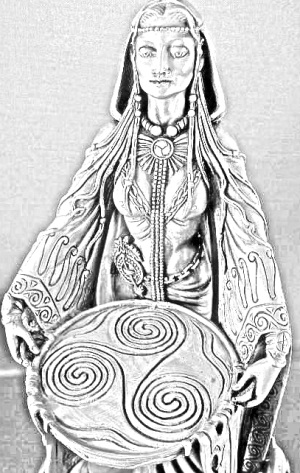
Celtic scholars agree that Danu is the name of a deity that ranked high in the Celtic Pantheon dating from the earliest history of the Celtic peoples. The consensus seems to be that Danu was most likely the Celtic Mother Goddess and that she gave her name to the Tuatha Dé Danann (Children of Danu). But beyond this point the Celtic scholars diverge on the identity and origins of Danu. A mystical figure shrouded behind the curtain of lost knowledge that died with the last Druid.
There is general agreement that Danu is related and cognizant with the Irish deity Anu, referred to as the mother of the gods of Ireland, and the Welsh deity Don, a mother fertility goddess. The similarity in spelling and the fact that Anu and Don are female deities related to the fertility of the land allows for the argument that Anu and Don are strongly connected to Danu and may be the same goddess in Irish and Welsh form and thus merging Goidelic and Brythonic.
Patricia Monaghan in the Encyclopedia of Celtic Mythology and Folklore has the following entry on Danu:
Most significantly, we find an Irish divine race, thought to represent the gods of the Celts, called the Tuatha Dé Danann, the people of the goddess Danu”. Similarly we have this entry from the Dictionary of Celtic Mythology by Peter Beresford Ellis: “A mother goddess from whom the Tuatha Dé Danann take their name. If her (Danu) counterparts in the Welsh tradition are anything to go by, Danu’s husband was Bile, god of death. The Dagda is her son.
Regardless of Danu’s origins, this deity lives on in the popular imagination of the modern Celtic nations. A survey of the internet discloses a technology firm in Ireland named Danu, the popular Celtic band Danu and many pubs named after the Celtic Mother Goddess. There are countless references to this Celtic deity in what might be called the genre of new age mysticism. Thus in spite of the scholarly speculation which hesitates as to her identity and origins, Danu has seeped into modern Celtic consciousness.